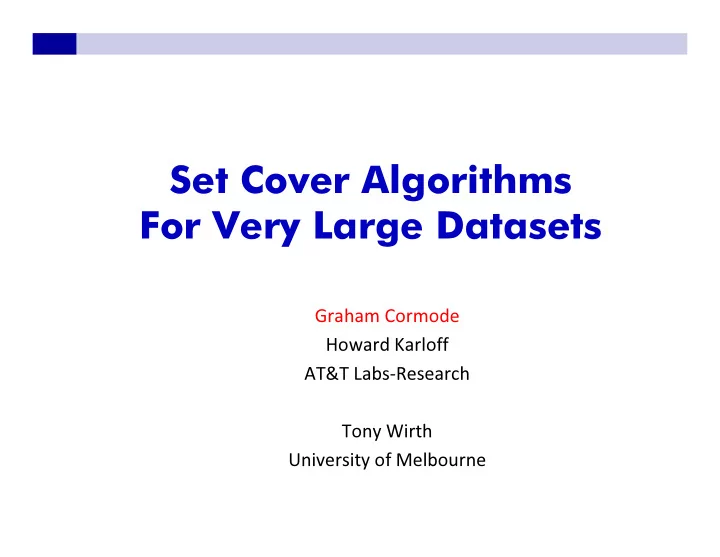

Set Cover Algorithms For Very Large Datasets Graham Cormode Howard Karloff AT&T Labs-Research Tony Wirth University of Melbourne
Set Cover? � Given a collection of sets over a universe of items � Find smallest subcollection of sets that also cover all the items. 2
Why Set Cover? � The set cover problem arises in many contexts: – Facility location: facility covers sites – Machine learning: labeled example covers some items – Information Retrieval: each document covers set of topics – Data mining: finding a minimal ‘explanation’ for patterns – Data mining: finding a minimal ‘explanation’ for patterns – Data quality: find a collection of rules to describe structure 3
How to solve it? � Set Cover is NP-hard! � Simple greedy algorithm: – Repeatedly select set with most uncovered items. – Logarithmic factor guarantee: 1 + ln n – No factor better than (1 - o (1)) ln n possible – No factor better than (1 - o (1)) ln n possible � In practice, greedy very useful: – Better than other approximation algorithms – Often within 10% of optimal 4
Existing Algorithms � Greedy algorithm: 1+ ln n approximation – Until all n elements of X are in C (initially empty): � Choose (one of) set(s) with maximum value of | S i - C | � Let C = C ∪ S i* � Naïve algorithm: no guaranteed approximation – Sort the sets by their (initial) sizes, | S i |, descending – Single pass through the sorted list: � If a set has an uncovered item, select it � Update C 5
Example greedy ABCDE ABDFG AFG BCG GH EH C I A E I 6
Optimum ABCDE ABDFG AFG BCG GH EH CI A E I 7
What ’ s wrong? � Try implementing greedy on large dataset: – Scales very poorly � Millions of sets with universe of many millions of items? � Dataset growth exceeds fast memory growth � If forced to use disk: selecting “largest” set requires updating set sizes to account for covered items � Even 30Mb instance required >1 minute to run on disk 8
Implementing greedy � Main step: find set with largest | S i - C | value � Inverted index: – Maintain updated sizes in priority queue – Inverted index records which sets each item is in – Costly to build index, no locality of reference – Costly to build index, no locality of reference � Multipass solution: – Loop through all sets, calculating | S i - C | on the fly – Good locality of reference, but many passes! – If | S i* - C | drops below a threshold: � Loop adds all sets with specific | S i* - C | value 9
Idea for our algorithm � Huge effort to find max | S i - C | � Instead find set close to maximum uncovered size � If always at least factor α × maximum: – We have 1 + (ln n) / α approximation algorithm – Proof similar to that for greedy � We call it Disk-Friendly Greedy (DFG) 10
How to achieve this � Select parameter p > 1: governs approximation and run time � Partition sets into subcollections: – S i in Z k if: p k ≤ | S i | < p k +1 � For k ← K down to 0: – For each set S i in Z k : � If | S i - C | ≥ p k : select S i and update C � Else: let S i ← S i - C and add it to Z k’ : p k’ ≤ | S i | < p k’ +1 � For each S i in Z 0 : select S i , update C , if has uncovered item 11
Example DFG run 4–7 ABCDE ABD FG 2–3 2–3 AFG AFG BCG BCG H H E E H H C C I I G G 1 A E I 12
In-memory Cost analysis � Each S i either selected or put in lower subcollection � Guaranteed to shrink by factor p every other pass � Total number of items in all iterations is (1 + 1/( p -1))| S i | � So 1 + 1/( p -1) times input read time 13
Disk model analysis � All file accesses are sequential! � Initial sweep through input � Two passes for each subcollection – One when sets from higher subcollections added – One to select or knock down sets � Block size B, K collections: – Disk accesses for reading input: D = ∑| S i |/ B – DFG requires 2 D [1 + 1/( p -1)] + 2 K disk reads 14
Disk-based results � Tested on Frequent Itemset Mining Dataset Repository � Show results on kosarak (31Mb) and webdocs (1.4Gb) time (s) |Solution| kosarak.dat naive 8.51 20664 multipass multipass 331.66 331.66 17746 17746 greedy 98.66 17750 DFG 2.61 17748 webdocs.dat naive 91.21 433412 multipass — — greedy — — DFG 86.28 406440 15
Memory-based results time (s) |Solution| kosarak.dat naive 2.20 20664 multipass 4.21 17746 greedy 2.99 17750 DFG DFG 1.97 1.97 17741 17741 webdocs.dat naive 100.98 433412 multipass 8049.08 406381 greedy 199.02 406351 DFG 93.38 406338 16
Impact of p � RAM-based results for webdocs.dat � Improving guaranteed accuracy only increases running time by 50% (30s) � Observed solution size improves, though not as much 17
Summary � Noted poor performance of greedy, especially on disk � Introduced alternative algorithm to greedy: – Has approximation bound similar to greedy � On each disk-resident dataset: our algorithm 10 × faster � On largest instance: over 400 × faster � Solution essentially as good as greedy � Disk version almost as fast as RAM version: – Not disk bound! 18
Recommend
More recommend